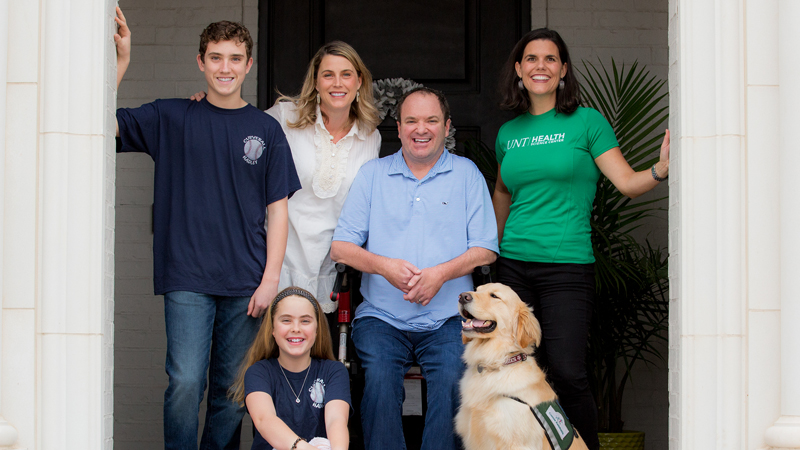Family and friends keep a former runner in the Cowtown race
By Jan Jarvis
It started with one of those memory notifications that pop up on Facebook.
The photo was of Collin Hadley running the Cowtown Half Marathon in 2014, and it hit his wife Emily like a ton of bricks.
“I would give anything to be able to see Collin run again,” she said.
Although Amyotrophic lateral sclerosis or ALS has stolen Collin’s ability to run, it won’t prevent the Fort Worth man from participating in the 2018 Cowtown Half Marathon.
On Sunday, friends, family members and colleagues will become Collin’s legs, pushing him over 13.1 miles of flat streets and steep hills until they reach the finish line.
Emily, who came up with the idea of pushing Collin in the race, sees it as a chance for this once avid runner to experience the euphoria of being in a race again.
But for Collin, it’s different.
“It’s another demonstration of the unbelievable network of friends supporting us,” he said.
Between 25 and 30 people have signed up for one-mile slots pushing Collin in a special chair provided by Ainsley’s Angels and designed for runs.
Blair Chappell, marketing manager at UNT Health Science Center, is one of them. When she noticed no one had signed up for mile eight, a steep hill near Panther Island, she knew she had to commit to it with her husband Wade.
“Truly, nobody was signing up for it, and I knew that Wade and I could do it together,” she said. “They’re church family, and we wanted to be supportive.”
Dozens of friends and family will be stationed along the route to cheer on the Curveball Hadley team as it weaves through Fort Worth.
 There’s meaning in the team’s name, which grew out of Collin’s frustration watching baseball players to strike out without ever swinging at a pitch.
There’s meaning in the team’s name, which grew out of Collin’s frustration watching baseball players to strike out without ever swinging at a pitch.
“I’ve been thrown the biggest curveball of my life with ALS,” Collin said. “Emily dubbed my team Curveball Hadley because she knows I’ll never give up and keep swinging to the end.”
It’s been that way since that day in October 2014 when they learned that the severe calf pain and weakness he had been experiencing during long runs was more than just a distraction. It was a symptom of ALS.
At first they kept the diagnosis to themselves. ALS, or Lou Gehrig’s disease, is progressive and causes the muscles to deteriorate. It’s a hard diagnosis to accept and there’s no cure. Most people live 2-5 years after the first symptoms appear. But at least 1-in-10 people live more than a decade.
Gradually, they shared the difficult news with their children, family and friends.
They were determined to make the most of their time together and latched on to the slogan “Don’t count the day, make the days count.”
They have done exactly that ever since, cramming beach vacations and ski trips into a couple of years.
Since 2014, Collin, 44, has gone from walking to using a power wheelchair, but he has continued working for DaVita Healthcare. His service dog Boston, a golden retriever, is always available to pick up whatever Collin drops.
Some of the Hadleys’ time has been spent raising funds for the ALS Therapy Development Institute, a non-profit organization dedicated to finding new treatments for the disease.
Most of all, they’ve made memories.
Last year, when their 14-year-old son Connor started running track, they got to see him compete in the 400-meter race. That night Connor left the blue ribbon he won on his father’s desk with a note saying, “This is for you, bro. I ran for you tonight.”
They expect to make memories again this Sunday during the Cowtown Half Marathon, thanks to the people who have supported them all along the way.
“I think if we had said Collin wants to skydive, they would have all said, where are our parachutes?” Emily said. ”It is just incredible how people have wanted to love on us.”







Social media